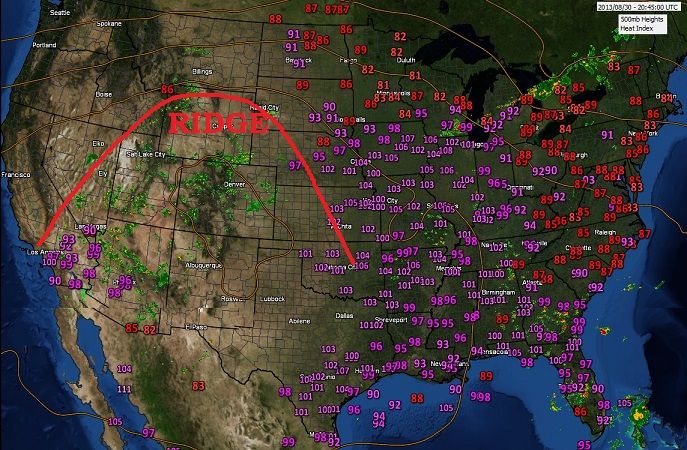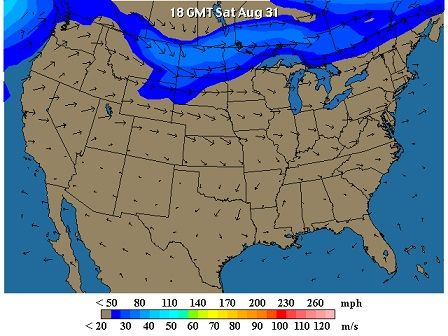Read the article. I love questioning conventional wisdom. Love the talk about the oceans transporting heat up. The test they did to find a result ..
1. Sea Surface temps, suns absorbtion, exchange of heat between ocean & atmosphere
2. Solar warming, surface heat, eliminated ocean heat transport horizontally
"This result would suggest that oceanic heat transport does not matter at all to the difference between the winter climates of western Europe and eastern North America! We concluded that the temperature difference must, as we had speculated before, be caused by other processes"
I love questioning things but are we to believe based on just these 2 tests we are going to assume the oceans have no role???
"Our revised view of things did not mean that heat transport in the ocean does not influence climate. The ocean indeed absorbs more heat from the Sun near the equator than it loses back to the atmosphere (primarily by evaporation). And oceanic currents indeed move the excess heat poleward before releasing it to the atmosphere in the middle latitudes. Consequently, removal of the oceanic heat transport globally in our modeling exercise warmed the equator and cooled everywhere else."
Ahhh, thank you. So they tell us about the test results and tell us oceans doesn't affect it at all, but then tell us their "revised" view of things says the Oceans do play a role in the climate.
Then go on to say when removing ocean heat, areas were colder.
The article kept mentioning west to east movement. Different from a 30,000 foot river of air. Much different. Again, I will ask... are you guys and this guy implying a Jet stream at 4-8 miles in the atmosphere is moved from mountains at 1-2 miles up?
Moving on..
"The conservation of angular momentum, it turns out, causes the mountains of North America to contribute substantially to the dramatic difference in temperatures across the Atlantic. ... when air flows over a mountain range—say, the Rockies—it gets compressed vertically and, as a consequence, tends to spread out horizontally. ...
On the far side of the Rockies, the reverse happens: The air begins to stretch vertically and contract horizontally, becoming most contracted in the horizontal when it reaches the Atlantic."
Lets stop there... Talking about air going up a mountain to 13,000 feet and then dropping down the other side.....reaching the Atlantic?... Yup, it does, but the "flow" like I said previously has to support it being zonal or with sinking air.
Taking a break from this for a second... Lets use yesterdays temperatures for an example...
Why would the warmest temps be outside the center of a ridge??? The 90s and 100s hot temps was a result from downslope affect of the rockies which kept the East warm as well even though there was a Northwest flow.

But wait a second.... Does that mean the jet stream was dictated by the Rockies?
Here's the
jet stream setup of this morning (similar to yesterdays)... It's not even over the U.S.

Moving on...
having moved to the south after crossing the mountains, it is now at a latitude where the planetary component of its angular moment is less than it was originally. .. This first southward and then northward deflection creates a waviness in the generally west-to-east flow of air across North America and far downwind to the east.
Such waves are of massive scale. The southward flow takes place over all of central and eastern North America, bringing Arctic air south and dramatically cooling winters on the East Coast. The return northward flow occurs over the eastern Atlantic Ocean and western Europe, bringing mild subtropical air north and pleasantly warming winters on the far side of ocean.
Hang on... Are you saying we dont see a southward arctic airflow over the West and Northward flow in Eastern North America and that Western Europe never has a return Polar flow?? Lets start with 2012 and look at the flow in the Eastern U.S and Western U.S. We can pull up many maps proving there are times.. Were the Rocky mountains sleeping at that point?
Topographically forced atmospheric waves contribute significantly to the large difference in winter temperature across the Atlantic. When Battisti and I removed mountains from our climate models, the temperature difference was cut in half. Our conclusion was that the large difference in winter temperature between western Europe and eastern North America was caused about equally by the contrast between the maritime climate on one side and the continental climate on the other, and by the large-scale waviness set up by air flow over the Rocky Mountains.
First... removing mountains from an equation? Interesting.
Second... again mentioning "air flow"... Did I miss the talk about the actual jet Stream?
My conclusion is simple...
Yes, Oceans take forever to cool down or warm up on average, the amount of energy it releases into the atmosphere is insane.
Yes, Land cools quicker.
Yes, the Rockies play a role in temperatures across the U.S but only when the flow supports it. Appalacians, Gulf of Mexico and Canada does as well.
Yes, the Atlantic is warm but just like the Pacific every 20-30yrs it changes temp trends.
Yes, there are High pressures in the Atlantic which helps keep the air warm which wasn't even mentioned
Yes, rising air from oceans and land (even the mountains) affect the airflow high in the Atmosphere "at times"
No, the Rockies don't help Western Europe stay warmer in the winter than Eastern U.S.
It seems this particular myth has grown to such a massive size that it exerts a great deal of pull on the minds of otherwise discerning people.
This is not just an academic issue. The play that the doomsday scenario has gotten in the media—even from seemingly reputable outlets such as the British Broadcasting Corporation—could be dismissed as attention- grabbing sensationalism. But at root, it is the ignorance of how regional climates are determined that allows this misinformation to gain such traction. Maury should not be faulted; he could hardly have known better. The blame lies with modern-day climate scientists who either continue to promulgate the Gulf Stream-climate myth or who decline to clarify the relative roles of atmosphere and ocean in determining European climate. This abdication of responsibility leaves decades of folk wisdom unchallenged, still dominating the front pages, airwaves and Internet, ensuring that a well-worn piece of climatological nonsense will be passed down to yet another generation
And I bet we can find an article about how the Gulf Stream and Warmer Atlantic plays the sole role of keeping Western Europe warm without the affects of the Rockies.


 Please register to participate in our discussions with 2 million other members - it's free and quick! Some forums can only be seen by registered members. After you create your account, you'll be able to customize options and access all our 15,000 new posts/day with fewer ads.
Please register to participate in our discussions with 2 million other members - it's free and quick! Some forums can only be seen by registered members. After you create your account, you'll be able to customize options and access all our 15,000 new posts/day with fewer ads.